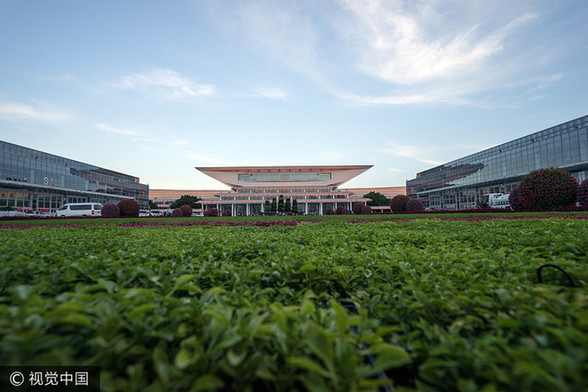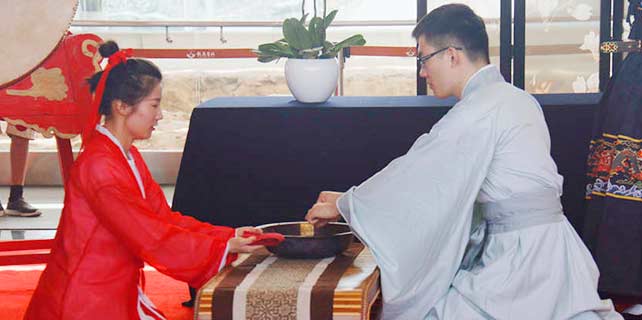Xiamen BRICS Summit will inject vitality into China-Indian relations
|
 |
|
The outside of China Xiamen International Conference & Exhibition Center is open to the public in Xiamen, Fujian province on Aug 29. The 2017 BRICS Summit will be held right here from Sept 3 to 5. [Photo/VCG] |
This year marks the 10th anniversary of the establishment of BRICS. With the theme, "BRICS: Stronger Partnership for a Brighter Future," China will host the 9th BRICS Summit in East China’s coastal city of Xiamen, Fujian province, from Sept 3-5, in its capacity as chair of the influential bloc comprising five countries, namely Brazil, Russia, India, China and South Africa. This is the second time China will host the event after 2011.
It is hoped that the Xiamen summit will bring together the leaders of all the member countries, including President Vladimir Putin of Russia, President Jacob Zuma of South Africa, President Michel Temer of Brazil, Prime Minister Narendra Modi of India and President Xi Jinping of China. It is important to note BRICS countries have entered a second "golden decade” amid mounting global challenges, as well as increasing uncertainties and instability in the international landscape. As such, it can be expected that the leaders of the five countries will make greater progress in their cooperation adhering to the multilateralism principle and basic norms for international relations.
Since the first summit in 2009, the BRICS group, home to 43 per cent of the world’s population with a combined GDP of over USD 16 trillion, is playing an integral role in shaping global economic policy and fostering a healthy exchange of ideas and innovation within the bloc. The BRICS countries have been seen as an engine of world economic growth. Together, the five countries have been the source of more than half of global growth in the past 10 years. As per the words of Chinese President Xi Jinping, "The BRICS countries are the champions of the emerging countries and developing countries. They are important members of the G-20."
Cooperation among BRICS nations is an innovative practice that has surpassed the outdated mentality of political and military allies and built the partnership with mutual trust and benefits. A few words from President Xi deserve to be quoted here: "As long as we follow the BRICS spirit of openness, inclusiveness, cooperation and win-win results, and work together to build a closer BRICS partnership, we will surely have the second golden 10 years for BRICS cooperation." Xi said this on July 28 while meeting with heads of the delegations for the 7th Meeting of BRICS High Representatives for Security Issues.
However, the 9th BRICS summit is taking place against the backdrop of deteriorating China-India relations following the ongoing standoff between Indian and Chinese soldiers in the Donglang area of the Sikkim sector of the China-India border. It is expected China and India, as major countries with great influence in BRICS, should boost mutual cooperation despite some friction.
As two big neighboring countries, India and China are the two most vital powers within the BRICS countries. Both countries are now members of basically all international organizations and institutions and significant investors in almost all regions of the world. The two countries are the second and seventh largest world economies, respectively, ranking second and first in terms of growth rate, and first and third in terms of contributions to world economic growth.
From the Indian perspective, it is expected that Modi will hold a detailed bilateral discussion with Xi on the sidelines of the BRICS summit to normalize heated relations with China that benefit the people of both countries.
The two leaders last met in the BRICS leaders meeting on the sidelines of the G20 meetings in Hamburg on June 7. They complimented each other's nation’s roles in furthering the objectives of the BRICS group and the fight against terrorism. Modi appreciated the momentum in BRICS under Xi's chairmanship and extended full cooperation for the group’s upcoming 9th summit a success.
President Xi also appreciated India's strong resolve against terrorism and the momentum in BRICS introduced under India's chairmanship and through the outcomes of the Goa Summit in 2016. He also appreciated India's success in economic and social development and wished India even bigger success.
It’s really encouraging that the efforts to improve relations between the two countries is embodied by the two leaders extending their hands of friendship at every available opportunity and there is hope that such exchanges will lead to greater understanding and even better trade and bilateral ties.
Undoubtedly, the upcoming 9th BRICS summit will be a great platform for India, where its voice will be heard by all countries. It can be said that India needs BRICS more than China does. BRICS has provided a platform for India to become an international rule-maker.
Besides, India can use BRICS to strengthen its relations with stronger economic actor China, if it wants to attract Chinese investment via the New Development Bank and the Asian Infrastructure Investment Bank. It will also be better for India to maintain its strategic partnership with Russia, Brazil, South Africa and other developing nations through BRICS.
To confine oneself in a cage or build walls is certainly no way out. Surely, cooperation and mutual trust between India and China will serve the interests of the region. It’s better for the two countries to reap some early harvest benefits in resolving their decades-old vexed border issue.
A Chinese proverb says, "When brothers are united, their sharpness can break metal.” As the two countries are neighboring powers, as well as members of BRICS, the Shanghai Cooperation Organization and G-20, it is hoped both sides will focus on cooperation and manage well such existing problems as the boundary issue, uphold a positive attitude to address emerging issues of the bilateral ties and set a vision for China-India relations.
To sum up, it can be hoped China and India will re-energize the BRICS mechanism, polish the color of BRICS, and strengthen the position of the bloc as the representative of emerging economies. The two countries must join hands in a durable friendship to rejuvenate an “Asian Century”.
Rabi Sankar Bosu is the Secretary of New Horizon Radio Listeners' Club in West Bengal, India.






















